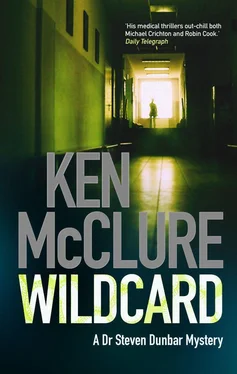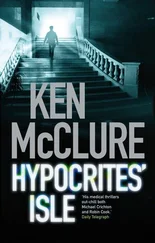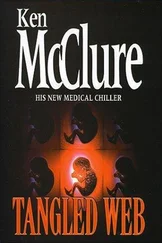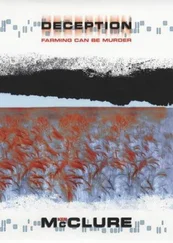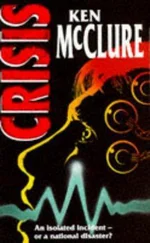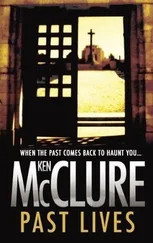Ken McClure - Wildcard
Здесь есть возможность читать онлайн «Ken McClure - Wildcard» весь текст электронной книги совершенно бесплатно (целиком полную версию без сокращений). В некоторых случаях можно слушать аудио, скачать через торрент в формате fb2 и присутствует краткое содержание. Жанр: Триллер, на английском языке. Описание произведения, (предисловие) а так же отзывы посетителей доступны на портале библиотеки ЛибКат.
- Название:Wildcard
- Автор:
- Жанр:
- Год:неизвестен
- ISBN:нет данных
- Рейтинг книги:4 / 5. Голосов: 1
-
Избранное:Добавить в избранное
- Отзывы:
-
Ваша оценка:
- 80
- 1
- 2
- 3
- 4
- 5
Wildcard: краткое содержание, описание и аннотация
Предлагаем к чтению аннотацию, описание, краткое содержание или предисловие (зависит от того, что написал сам автор книги «Wildcard»). Если вы не нашли необходимую информацию о книге — напишите в комментариях, мы постараемся отыскать её.
Wildcard — читать онлайн бесплатно полную книгу (весь текст) целиком
Ниже представлен текст книги, разбитый по страницам. Система сохранения места последней прочитанной страницы, позволяет с удобством читать онлайн бесплатно книгу «Wildcard», без необходимости каждый раз заново искать на чём Вы остановились. Поставьте закладку, и сможете в любой момент перейти на страницу, на которой закончили чтение.
Интервал:
Закладка:
‘The Public Health people have been working round the clock to isolate contacts, but unless we find out — and soon — where the disease originates from, we could be looking at a very unpleasant situation indeed. What do you think?’
‘Well, assuming that we’re talking about the same disease here — are we?’
‘Porton haven’t finished analysing the samples from the Manchester cases yet, but it would be a hell of a coincidence if it wasn’t.’
‘Then obviously the passenger, Barclay, and this woman, Danby, are the prime movers in the affair. We know how everyone else got the disease. We have to find out how these two got it.’
‘That’s where you come in,’ said Macmillan. ‘The authorities up in Manchester are going to be working flat out to contain the outbreak. Although there will be an epidemiological team investigating the cause, I want you involved as well, because it’s absolutely vital that we establish the source as quickly as possible. I’ve had this okayed at the highest level, so you’ll have a free hand to operate as you see fit. You’ll have the support of the police and the Public Health Service should you need them, and of course you’ll have access to all the medical and scientific back-up you need. What do you say?’
‘Do I have a choice?’
‘No.’
‘Then I say I’d best get started.’
‘Miss Roberts will prepare a background file for you in the usual way. After that, you’re on your own.’
‘This hasn’t reached the press yet?’ said Steven.
‘Only because the disease doesn’t have a name and there’s no obvious African connection to scaremonger about, but six associated people going down with something nasty is not going to go unreported for long.’
Steven had lunch in a city pub, an old-style pub with high ceilings and self-conscious Victorian fittings. He cut an anonymous figure as he sat in a corner, eating a cheese roll and sipping a beer while mulling over the situation. The thing troubling him most was the fact that the Public Health people had failed to establish a connection between the woman in Manchester and the Ndanga flight. If there really wasn’t one, it would suggest that there was an original source of viral haemorrhagic fever in Manchester. Not a happy thought. And not a likely one, either, he decided after some consideration. Despite the failure to establish a connection, there just had to be one. Maybe some lateral thinking was called for.
Although the true natural reservoir of Ebola and the other filovirus infection, Marburg disease, had not yet been established, he was aware of a strong suggestion among investigators that animals — particularly monkeys — were involved in the chain of events. If his memory served him right, the very first case of Marburg disease had been contracted in the German town of that name, back in the late 1960s by a worker who got it from an African lab monkey. If by any chance the woman in Manchester had had contact with animals — perhaps as a ‘friend of the zoo’ or as a voluntary helper or some such thing — that might conceivably be where she had picked up the disease. That would be the best possible outcome, he concluded. It would also be one hell of a coincidence.
Steven returned to the Home Office to pick up his briefing file, which he’d been told would be ready by two thirty if Miss Roberts worked through her lunch hour to collate information supplied by the authorities in Manchester. She obviously had, for a purple folder was waiting for him on her desk when he went into her office. Jean Roberts had gone off to have a late snack but she had left a Post-it note stuck to the cover of the file, wishing him well. He in turn left her one, thanking her.
Steven paused on the pavement outside and thought about taking the file home to read, but then decided on using the facilities of the medical library at the London School of Hygiene and Tropical Medicine, where he had a reader’s card. He would have access there to all the reference books and current journals he might need.
The first page of the Sci-Med file was entitled ‘Primary Victims’. Humphrey Barclay, he read, had been a middle-ranking civil servant who had been attached to the Foreign Office for the last fourteen years after shorter stints at the Ministry of Agriculture and the DHSS. He had a BA from Durham University in geography and had joined the civil service immediately after gaining his degree, a lower second. Two years later he had married Marion Court-Brown, daughter of a Surrey stockbroker, whom he had met at university. The marriage had produced two daughters, Tamsin and Carla.
Barclay’s annual job appraisals suggested that his career had been in the doldrums for the past few years, his performance never being assessed any higher than ‘satisfactory’ during the past four. Illness had played a part, in that he had suffered intermittently from heart problems, although this had apparently been put right after surgery earlier this year.
Barclay’s being sent to Ndanga had been seen as a bit of a test by his superiors to find out if he merited promotion to the next grade after all. Barclay himself had been made aware of this and had been keen to do well, according to his superior, Sir Bruce Collins. Confidential vetting reports obtained from Special Branch suggested that there was no scandal in Barclay’s life. He was honest, straight and reliable to the point of being dull. Steven sighed and moved on to the next file.
Ann Danby had been thirty-three at the time of her death; she was unmarried and lived alone in Palmer Court, an expensive apartment block on the West Side of Manchester. She was a graduate of the University of Manchester in computer studies, and worked as an IT specialist with Tyne Brookman, a large academic publishing firm in the city. Her parents also lived in Manchester and she had one brother, John, who lived and worked in London for a public relations firm. By all accounts, she had been settled and content, even if regarded as a bit of a loner by her neighbours — although university involvement in a whole variety of societies had suggested otherwise. No one interviewed could suggest a reason why Ann Danby should want to take her own life, and the possibility of this action being connected with her illness seemed entirely plausible. She had not been outside the UK since 1998 when she had taken a package holiday to Majorca, apparently alone. She had never been to Africa, nor had she any known connection with anyone who had.
Steven shook his head and sighed again. There was absolutely nothing in these two biographies to suggest an opening course of action. He couldn’t see a first move and first moves were all-important, be it the first leg of a journey or the first move in a chess game. Get it wrong and it could be hard to recover lost ground. He moved on to the list of ‘Secondary Victims’ but found nothing helpful — it was quite clear how these people had contracted the disease. It was impossible not to be struck by the tragedy of so many young lives being wiped out; the stewardess and the nurse had both been well under thirty.
Steven noted down some key points for a plan of action. He saw the impending report from Porton as being critical, because it would establish whether or not the two outbreaks had been caused by the same virus. If, by any chance, they had not — and he sincerely hoped against hope that this might be the case — he would concentrate all his efforts on finding out where Ann Danby had picked up the disease, starting first with any animal connection he could establish. If, as was more likely, the two viruses turned out to be one and the same, he would have to gamble on there really being a connection between Ann Danby and the Ndanga flight, despite the authorities’ failure to find one. Either way, Manchester was the place to be. He would travel up there in the morning. In the meantime, he would read up on filovirus infections and in particular the reports on any recent outbreaks of the disease. He started with the 1995 epidemic of Ebola in Kikwit in Zaire where 80 per cent of the 360 cases identified in the outbreak died.
Читать дальшеИнтервал:
Закладка:
Похожие книги на «Wildcard»
Представляем Вашему вниманию похожие книги на «Wildcard» списком для выбора. Мы отобрали схожую по названию и смыслу литературу в надежде предоставить читателям больше вариантов отыскать новые, интересные, ещё непрочитанные произведения.
Обсуждение, отзывы о книге «Wildcard» и просто собственные мнения читателей. Оставьте ваши комментарии, напишите, что Вы думаете о произведении, его смысле или главных героях. Укажите что конкретно понравилось, а что нет, и почему Вы так считаете.
